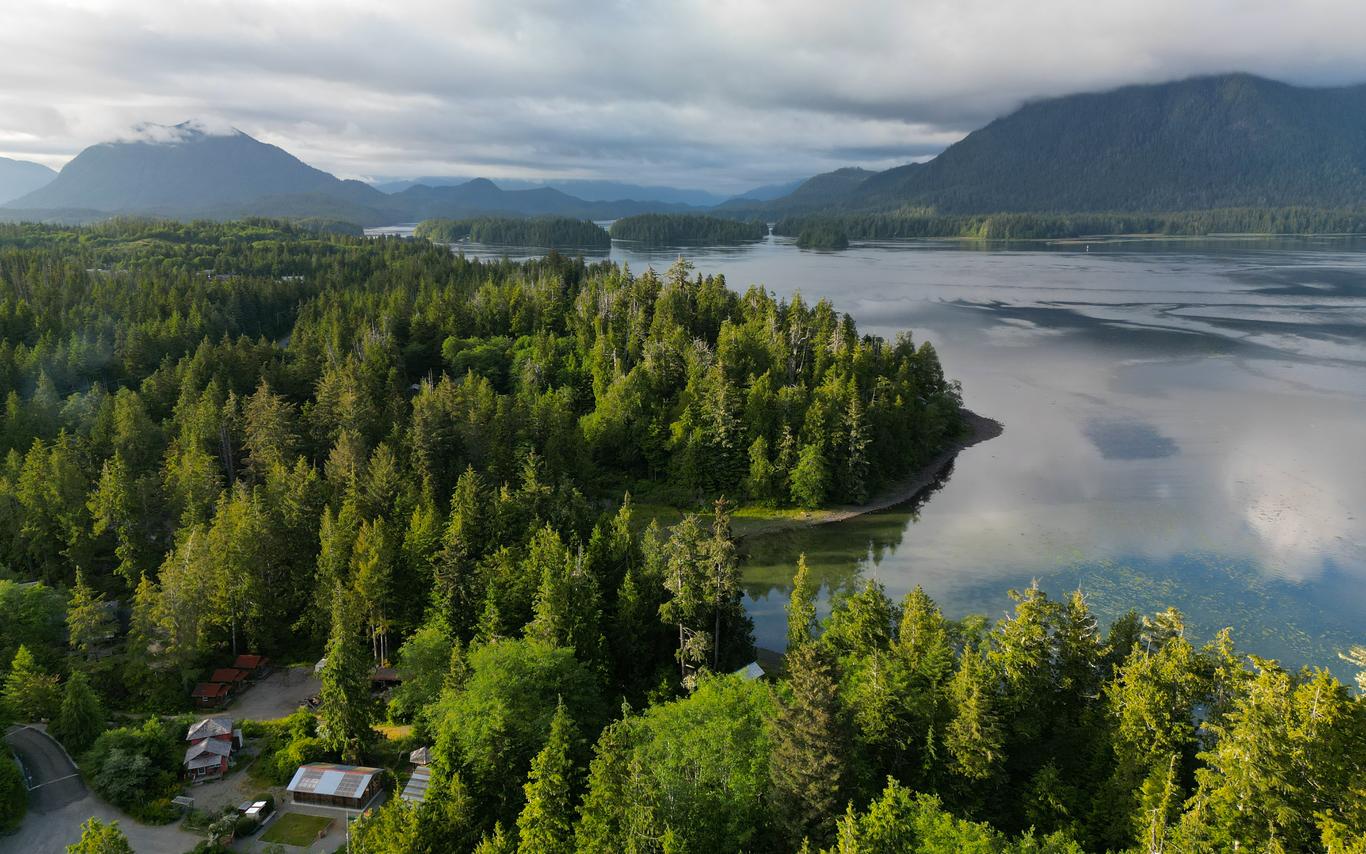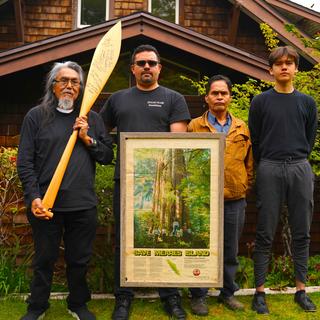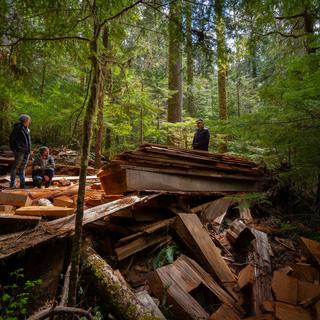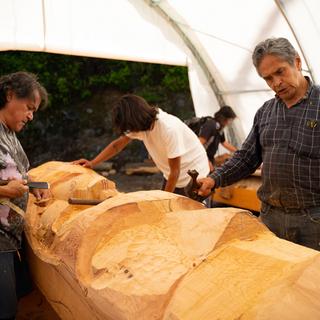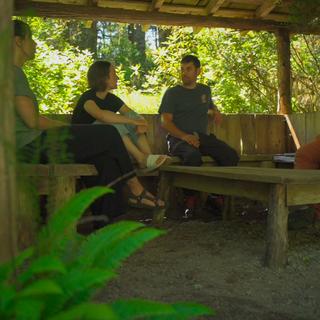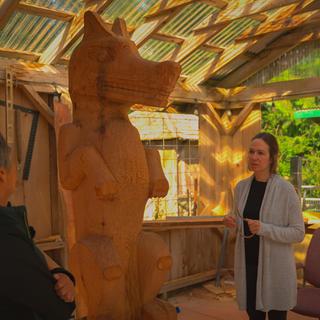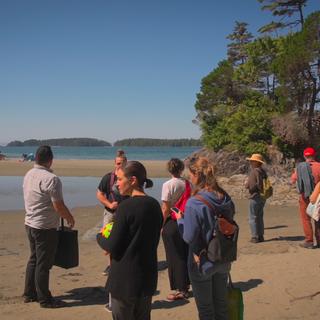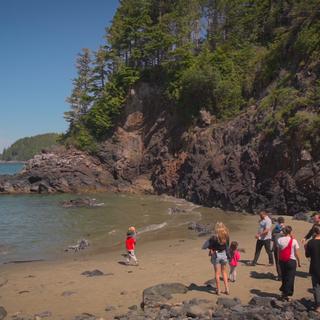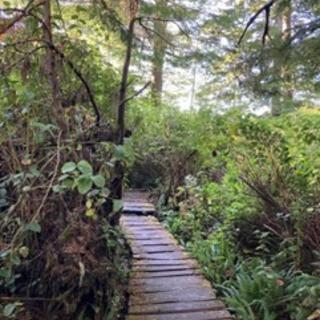The only post-secondary program dedicated to Indigenous protected and conserved areas!
Program overview
The IPCA Planning Advanced Certificate is for Indigenous governments, and those wishing to support Indigenous governments, to plan and establish IPCAs.
The IPCA Planning Advanced Certificate builds capacity for a new generation of planners with the knowledge and skills to support the planning, establishment and stewardship of IPCAs and Indigenous-led conservation initiatives in Canada.
In partnership with the IISAAK OLAM Foundation, Vancouver Island University designed and launched Canada’s only post-secondary program specializing in planning for Indigenous Protected and Conserved Areas (IPCAs) in 2022.
The certificate includes six interconnected courses that provide a holistic understanding of various aspects of IPCA planning. Blended in-person and virtual course delivery is intended to serve individuals who are employed full-time.
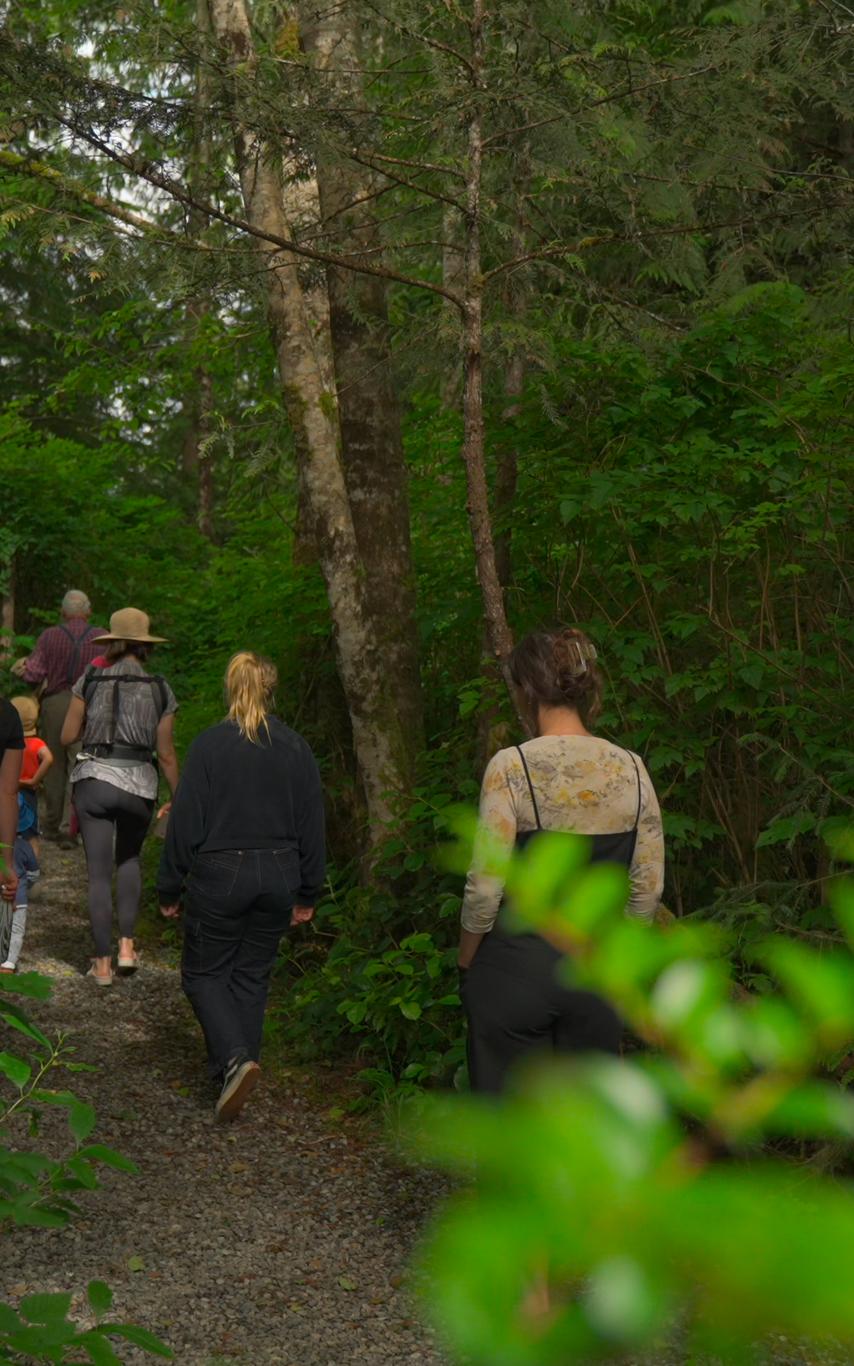
Program outcomes
By the end of this program, you will be able to support Indigenous leadership to plan and implement IPCAs by:
- Practicing and fostering Ethical Space through self-reflection, cultural humility and a meaningful understanding of one’s roles and responsibilities;
- Analyzing complex contexts and systems in which IPCAs are established and continue to evolve; and
- Applying diverse Indigenous and Western planning principles and approaches.
Application steps
- Sign-in or create your EducationPlannerBC account
- Update your EducationPlannerBC account profile
- Select institution (Vancouver Island University) or return to the IPCA Application Page
- Complete application - provide these answers:
- What category best describes you? Applying to an Undergraduate Program
- Select your subject area: Bachelor of Arts
- Select your program: Indigenous Protected and Conserved Areas Planning Advanced Certificate
- Campus: Nanaimo
- Submit and review application
- Applicants will be contacted for a short entrance interview
Or if needed you can print off and apply through a hard-copy application: VIU Application for Admission
Admission requirements
Completion of post-secondary diploma or completion of minimum of 54 academic credits including VIU’s Degree English Requirement.
Students who do not meet the minimum requirements may be accepted by the the program director on a case-bycase basis.
Students who meet or exceed the minimum admission requirements are not guaranteed admission to the program.
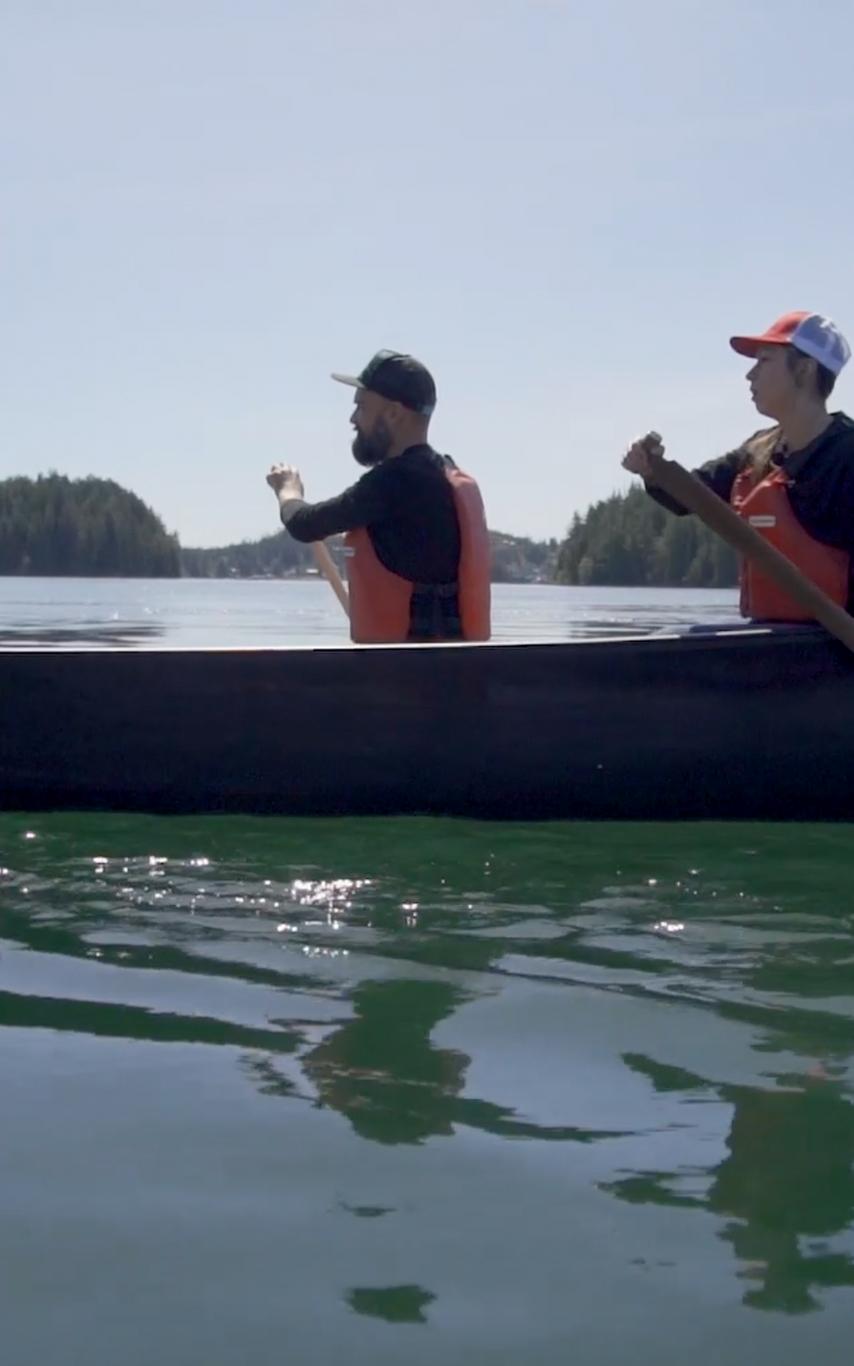
Apply now
Registration is open for the 2026-2027 cohort. We encourage you to apply as early as possible. There are 24 seats available and eligible applicants are admitted on a first come, first served basis.
Program details
Course dates and delivery method
The 6 courses are delivered over 10 months between August 17, 2026 and June 2027. Each course involves 40 hours of class time, not including homework and travel to and from the field course. Virtual courses are taught on Fridays between 9 am and 5 pm PST.
Course 1 (in-person): IPCA 407 - Advanced Field Study in an Indigenous Protected and Conserved Area
August 17 to 21, 2026 with travel from Nanaimo to Tofino and return included. We recommend you arrive in Nanaimo the night of August 16 and arrange your own accommodations if you travel from out-of-town.
Course 2 (virtual): IPCA 417 - Introduction to Indigenous Protected and Conserved Areas
September 11, September 18, September 25, October 2, October 9, 2026.
Course 3 (virtual): IPCA 447 - Indigenous Protected and Conserved Areas in B.C.: History, Law, and Politics
October 30, November 6, November 13, November 20, November 27, 2026.
Course 4 (virtual): IPCA 457 - Indigenous Protected and Conserved Areas in B.C.: Ecological, Cultural, and Socioeconomic Opportunities
January 22, January 29, February 5, February 12, February 19, 2027.
Course 5 (virtual): IPCA 427 - Indigenous Knowledge Systems and Principles of Land Relationship Planning
April 2, April 9, April 16, April 23, April 30, 2027.
Course 6 (virtual): IPCA 437 - Planning, Establishing, and Managing Indigenous Protected and Conserved Areas
May 21, May 28, June 4, June 11, June 18, 2027.
Course descriptions
This course consists of an experiential and immersive field study in an Indigenous Protected and Conserved Area (IPCA). Students will engage meaningfully with the people, place, and culture, reflecting critically on their social positions, worldviews, and approaches to planning. Prerequisites: Min “C” in English 12
Monica Shore, instructor for IPCA 407 - IPCA Field Study
This course introduces students to the definitions, principles, and practice of Indigenous Protected and Conserved Areas (IPCAs) in Canada. Students will learn international and domestic policies relevant to IPCAs and the role of Treaty relationships between Indigenous Nations, their lands, and newcomer societies. Diverse examples of IPCAs are presented. Prerequisite: Min. “C” in English 12
Dr. Soudeh Jamshidian, instructor for IPCA 417 - Intro to IPCAs
This course introduces students to the principles of planning with an Indigenous knowledge systems lens, as informed by Indigenous and Natural Laws. Ethical Space is presented as a knowledge systems interface to promote equitable and respectful engagement between Indigenous and Western approaches to planning for Indigenous Protected and Conserved Areas. Prerequisite: Min “C” in IPCA 417
Dr. Allyson Menzies, instructor for IPCA 427 - Indigenous Knowledge Systems
This course explores practical considerations for planning, establishing, and managing Indigenous Protected and Conserved Areas (IPCAs). Students will learn about processes and pathways for establishing IPCAs, jurisdictional considerations, capacity and financial needs of IPCAs, connections to Indigenous cultures, and the roles of planners in supporting IPCA planning, establishment and management.
Eduardo Sousa, instructor for IPCA 437 - Creating IPCAs
This course provides a historical overview of Indigenous and newcomer relations in British Columbia, focusing on the legal and jurisdictional implications of this history for Indigenous Protected and Conserved Areas (IPCAs). Aboriginal Title, Treaties, case law, and modern agreements are explained, and diverse governance options for IPCAs in BC are explored.
Dr. Justine Townsend, instructor for IPCA 447 - History, Law, and Politics in BC
This course explores the roles of Indigenous Protected and Conserved Areas (IPCAs) in promoting ecological, cultural, and socioeconomic well-being. The course explores roles and opportunities for IPCAs in habitat protection, ecological restoration, cultural revitalization, reconciliation, food sovereignty, and economic resilience, with specific reference to the BC context.
Eric Wilson, instructor for IPCA 457 - Ecological, Cultural, and Socio-Economic Opportunities
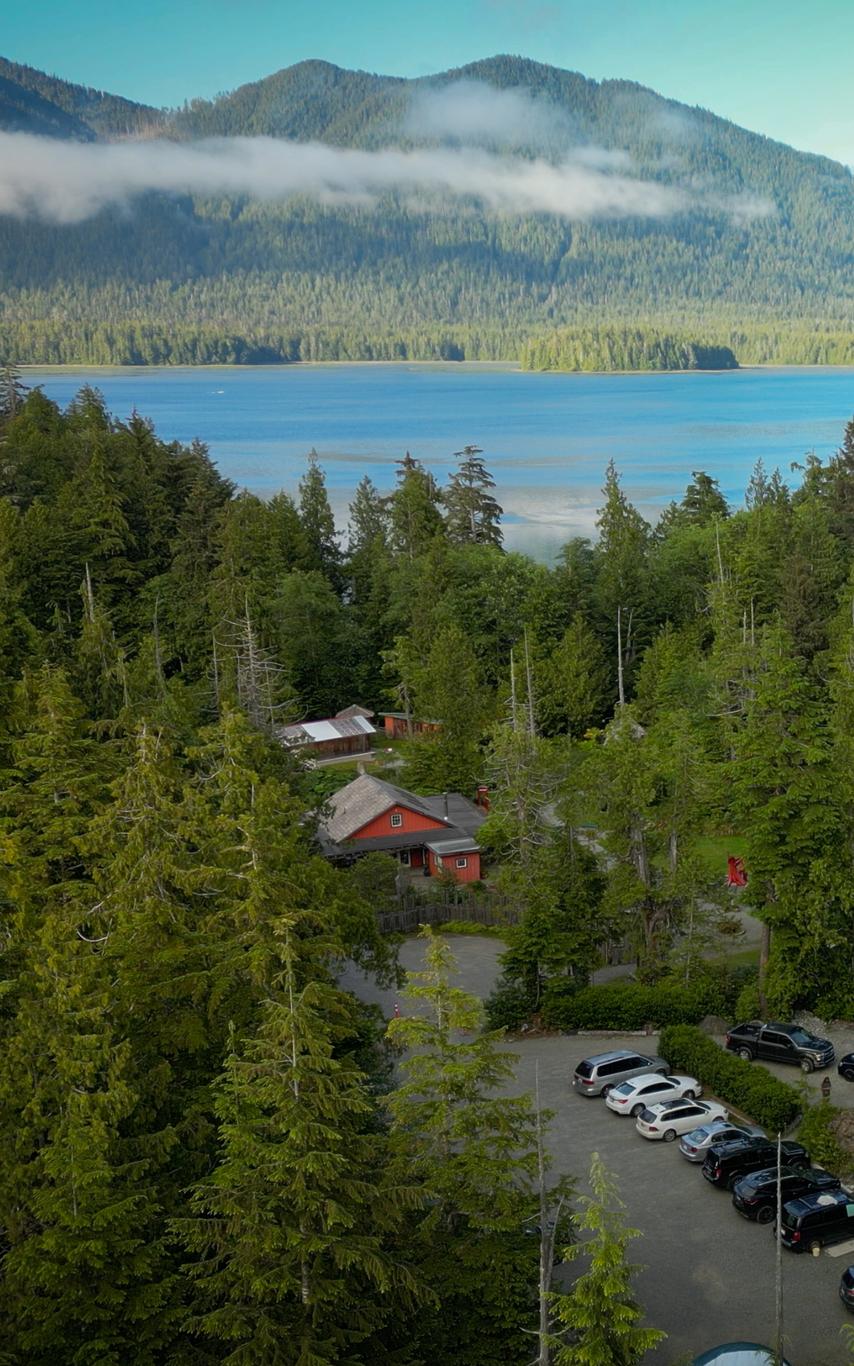
Guiding principles of the IPCA Planning Advanced Certificate
Program principles are the shared values, mindsets, and guideposts for students and instructors in the IPCA Planning Advanced Certificate. These principles are also foundational to IPCAs. The five program principles are: Ethical Space, respect/iisaak, responsibility, reciprocity and diversity.
Learn more below.
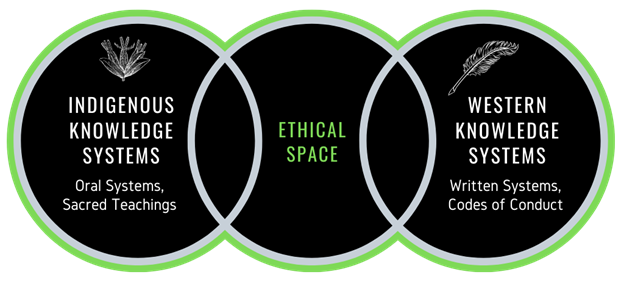
Ethical Space is the overarching principle and framework of the IPCA Planning Certificate. This framework is further animated through four additional program principles, described below:
Ethical Space is established through acceptance and a collective understanding that Indigenous and Western knowledge systems are equal. It is a space in which one knowledge system does not dominate another, where both can hold their ground, and where new understandings, relationships, and knowledge can be developed and/or transformed. It is a space of decolonization, healing, reconciliation, and commitment to equitable cross-cultural learning.
Ethical Space and the principles below will cultivate our capacity to communicate across differences.
In the Nuu-chah-nulth language, shared by fourteen nations on the west and mid coast of Vancouver Island, IISAAK (EE-sahk) is often translated simply as ‘respect,’ but also carries a much deeper meaning: “To observe, appreciate, and act accordingly.” IISAAK is the highest law of the Nuu-chah-nulth legal system, depicted visually through the Sun-Moon crest.
IISAAK is a program principle dedicated to highlighting the commitment that students and instructors will make to respecting each other, the perspectives and knowledge systems, the communities, and the environments where they study and work. IISAAK happens when we take time to slow down, observe our own biases, and appreciate the offerings made by our peers.
Responsibility is a program principle guiding our commitment to take leadership in our own learning journey and carry our weight within group projects and teamwork. This principle also invites us to show up and be present in the program and more broadly, communicate our appreciation and challenges, and care for the people, species, lands, and waters where we learn.
Reciprocity is a principle that speaks to our commitment to share our perspectives and knowledge, participate with courage and humility, and give as much as we receive. We are asked to equally share and listen, honour and give thanks to all knowledge holders (including peers), and act for the mutual benefit of all.
The principle of diversity marks a commitment to a distinctions-based approach to the program, recognizing that Indigenous Peoples across Canada are sovereign and independent, and that First Nations, Métis and Inuit peoples and governments have distinct contexts, histories, and challenges. Diversity also embraces the multiplicity of gender and race, and the diversity of people and perspectives required to make IPCAs successful.
Frequently Asked Questions
IPCAs are “…lands and waters where Indigenous governments have the primary role in protecting and conserving ecosystems through Indigenous laws, governance and knowledge systems” (Indigenous Circle of Experts, We Rise Together report, 2018).
The Government of Canada has recognized that IPCAs are an innovative land-use planning tool for achieving the goal of protecting 25% of lands and waters by 2025 and 30% by 2030.
The IPCA Planning Advanced Certificate is intended primarily for Indigenous (First Nations, Métis, and Inuit) governments, and non-Indigenous allies wishing to support Indigenous governments, to plan and establish IPCAs.
While the certificate is open to students across Canada, it is conducted in the Pacific time zone (e.g. 9am-5pm PT). Expectations for student attendance are the same regardless of where students are located. If you would find it challenging to participate in all of the sessions because of your time zone or other obligations, we encourage you to take the certificate at a time when you’re able to fully participate.
Instructors recognize that First Nations, Métis, and Inuit governments are establishing IPCAs in their territories, often under different names. As such, instructors strive to include relevant and diverse examples based on the interests and experience of each cohort.
We recognize and uplift Indigenous governments as those who have inherent and recognized rights and jurisdiction to establish IPCAs in their territories as they see fit. We center Indigenous self-determination as a core value of the program.
While some global context is provided, the focus of the certificate is on Indigenous-led conservation and IPCAs throughout Canada. However, the certificate is being delivered by Vancouver Island University in British Columbia (B.C.), where most of the instructors are based. As such, there may be a greater focus on the B.C. context. Students are encouraged to discuss examples and topics, including IPCAs, throughout Canada.
The field course, which is the first course in the program, takes place in B.C. (see Question 5).This VIU Advanced Certificate consists of six courses (one in-person field course and 5 virtual courses), each valued at three credits. Attendance is mandatory for all courses. Students are expected to attend all classes to gain a strong understanding of the complex and diverse approaches to IPCA planning. Each day of class that is missed represents 20% of the entire course. We wish to ensure that those graduating from the program walk away with a deep and nuanced understanding of the subject matter.
We encourage students to have conversations with their employers and families to ensure they can focus on the courses and set aside sufficient time to keep up with readings and assignments.
Field Course (Course 1)
The field course in September is an immersive learning experience over 5 days (not including travel to and from the meetup location). The field course includes field trips and guest talks by Indigenous leaders, Elders, and knowledge holders. The field course typically takes place at the Clayoquot Campus in Tla-o-qui-aht Tribal Parks (Tla-o-qui-aht territory/Tofino, B.C.) on the west coast of Vancouver Island.
Students are expected to participate fully in each day’s activities from approximately 9am to 5pm followed by group dinners and occasional evening events. To get the most out of this special experience, and to be respectful of our hosts and knowledge holders, it’s critical that students be fully available and present.
Virtual Courses (Courses 2-6)
For the 5 subsequent virtual courses, students are expected to be available from 9am-5pm PST for five consecutive Fridays for each course. Each virtual course consists of five classes over five weeks (or longer if a class falls on a statutory holiday).
For the virtual courses, expect 40 hours of “live” virtual class time plus an additional 2 to 4 hours a week for readings and assignments (some of which can be completed during class) for the duration of the course and possibly one to two weeks after each course ends. Out of respect for the instructors, guest speakers, and fellow students, it is expected that students make every effort to fully attend and participate in each class.
Each year of the certificate we accept a new cohort of students. The program is designed to guide each cohort of students through the courses together in the order they are offered. Courses are not offered on an individual basis. Individual courses may be audited upon request and based on availability. Full course fees apply to audited courses, however audited courses do not count towards earning the Certificate (and assignments are not required and will not be graded).
Each course has a different focus and theme. The courses build off of each other so that by the end of the certificate, students have a strong understanding of IPCAs. For example, we cover the evolving conservation context in Canada and globally, treaties and foundational agreements among Indigenous and settler society and institutions, Indigenous and Crown law, systems thinking and holistic approaches to planning, Indigenous worldviews connected to relational forms of planning, and much more.
The first course, IPCA 407, must be taken first. The remaining five courses are intended to be taken in the order offered. However, with program approval, it is possible to take a part-time path through the program and take some courses one year and complete the program in a subsequent year. As regular university courses, all assignments must be completed within the defined timeframes, and students must complete each course by its end-date before proceeding to the next course.
The cohort will have up to 24 students.
Virtual classes include instructor-led activities and talks, guest speakers, class discussions and activities, and student presentations. Generally, there will be dedicated times throughout each course for students to complete the weekly readings or work on assignments.
Given the short duration of each course, classes are less of a ‘deep dive’ into each course topic and more of an introduction to the IPCA space. There are plenty of opportunities to learn what students are working on in diverse territories across the country.
The program cost will be approximately $11,000 for 2025-2026. For a breakdown of the costs, please see "Program Fees". There are no exceptions to student fees; all VIU requirements for applications, registration, and fees apply to each student.
Each course is graded and a cumulative grade is given for the entire certificate. A minimum of a “C” grade is required to move from each course to the next course, and overall to graduate with the Certificate. Instructors and teaching assistants offer tailored feedback on assignments to support and challenge students in constructive ways.
The instructors have a breadth of experience that includes IPCAs and Indigenous-led conservation, land use planning, resource management, teaching and facilitation, human-centered design, and working with Indigenous Peoples.
Instructors thoughtfully curate the content of each course to foreground Indigenous perspectives, knowledge, and examples of IPCAs. Some instructors are Indigenous knowledge holders and experts on various aspects of IPCAs, others are non-Indigenous allies with specialized areas of expertise that contribute to student learning.
Learn more about the instructors and the courses they teach.
The IPCA Planning Advanced Certificate was established to serve Indigenous governments who are planning and establishing IPCAs, and to address a gap in the education system to support these actions. The program was conceived by Eli Enns, former Co-Chair of the Indigenous Circle of Experts, and designed by the IISAAK OLAM Foundation (IOF). Inspiration for the program emerged from the process led by the Indigenous Circle of Experts for the Pathway to Canada Target 1 which led to the new designation “Indigenous Protected and Conserved Area.”
In 2022, Vancouver Island University (VIU) and IOF, an Indigenous educational and capacity building organization, launched the IPCA Planning Advanced Certificate. We welcomed the first cohort of students in 2022 who graduated in 2023. VIU and IOF have been working together for several years on numerous projects to advance Indigenous-led conservation and IPCAs and have a strong partnership.
The IPCA Planning Advanced Certificate responds to one of the main challenges the Indigenous Circle of Experts identified concerning IPCA establishment in Canada: a lack of capacity. Through the certificate, we share knowledge, resources, and practices, and foster community. In doing so we aim to support Indigenous leaders and their teams plan, establish, and manage IPCAs, as well as conservation practitioners wishing to support IPCA development.
Contact
If you have any questions about the program, please contact the VIU Registrar.
Vancouver Island University gratefully acknowledges the support of our sponsors including the Real Estate Foundation of BC, the Conservation through Reconciliation Partnership, Braiding Knowledges Canada, and support from the IISAAK OLAM Foundation.

